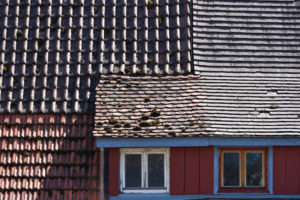
Remodeling your commercial roof is a critical project and investment. There are many factors to consider, including cost, energy efficiency, durability, location and even climate. It comes as no surprise that there’s a wide array of roof types on the market to choose from as well.
Below, Destin Roofing will help you learn more about different commercial roofing systems along with the benefits and drawbacks of each. Familiarizing yourself with the different types will help you better understand what to look for in your commercial roofing systems.
Metal Roofing
Perhaps the most popular material for commercial buildings, metal roofing is also one of the oldest forms of roofing systems. Archeologists have reported that copper roofs were used during the ancient world – most famously for the Pantheon!
Pros of metal roofing: Metal roofing provides a thick, protective layer between the building and dangerous environmental elements. Not only that, but metal roofing also has high energy-efficiency ratings. The metal reflects rays from the sun, which means surface temperatures often decrease and thus reduce the heat that makes its way inside. Metal roofs are also fire resistant, making them especially useful for businesses that may rely on heat, such as restaurants or offices.
Here are a few of the most common materials used for metal roofing:
- Corrugated, galvanized steel
- Metal sheets
- Stainless steel
- Copper
- Aluminum
Cons of metal roofing: As you might already expect, using these materials in large quantities can add up quickly. According to Home Advisor’s Guide to Roofing Costs, metal roofings can cost from $120 to $900 per 100 square feet of material. However, the upfront costs are worthwhile for many people, considering their roof will last them for several decades.
Built-Up Roofing (BUR) Membrane
Commonly referred to as simply “BUR,” built-up roofing membrane is the second most popular roofing system used for commercial buildings. According to BBC research, built-up roofing makes up the largest roofing system segment in America, valued at almost $700 million.
Pros of Built-Up Roofing: BUR roofing is your typical “tar and gravel” roof – made up of alternating layers of asphalt and supporting felt fabrics (also called ply sheets). These felts are strengthened using glass-fiber mats and other surfacing material like stone or gravel. Not only does this outer material look aesthetically pleasing, but it also protects the layers beneath it from UV rays, which improves energy efficiency.
All three layers of BUR roofing create an incredibly durable and long-lasting roofing system that’s exceptionally water-resistant. For this reason, BUR is often used for low slope roofs to ensure water slides down the roof effectively.
Cons of Built-Up Roofing: However, where BUR roofing falls short is water damage. If you live in an icy climate, freeze-thaw cycles are known to crack your BUR roof. This type of roofing system is also prone to blisters. This is when water damage is plus a scorching sun causes your roof to tear.
Thermoplastic (PVC & TPO) Roof Membrane
Thermoplastic polyolefin (TPO) and Polyvinyl chloride (PVC) commercial roofs might sound intimidating at first, but their goal is simple: they aim to provide strong resistance to external elements such as weather, chemicals, and UV rays.
Polypropylene-based materials are a type of thermoplastic. TPOs are polypropylene-based, except they were modified to have better flexibility and puncture resistance, making them more rubber-like than plastic. Based on the Heat Aging and the Accelerated Weathering tests, TPO ranks higher than PVC in its ability to handle harsh weather.
Pros of PVCs: PVCs are also a type of thermoplastic, but they differ from TPOs in that PVCs are more chemical resistant. They don’t absorb oils or greases, making this type ideal for restaurants. PVC is more costly than TPOs, but they can handle chemicals that TPOs can’t and are more eco-friendly.
Cons of PVCs: Both thermoplastics can be formulated to resist UV rays, impact and tears, bacterial growth, and chemicals. But both types also have their own disadvantages to consider as well. TPOs are cheaper but require heat welding for installation, which can be pricier. PVCs are more chemical resistant, which means they’re also stiffer, making them harder to install. It’s important to weigh these advantages and disadvantages carefully to gauge which type is the best fit for you.
Asphalt Shingle Roofing
Most people are familiar with the word “shingles” since shingle roofing is used for most traditional homes and residential buildings. What many people don’t know, however, is that many commercial roofing applications use shingles as well.
Pros of Asphalt Shingle Roofing: The most common shingle type used for commercial buildings is asphalt shingles. Asphalt is a by-product of oil refineries, making asphalt shingles one of the most inexpensive and abundant roofing materials available. Asphalt shingles are also lightweight (which requires less intensive labor) and durable, often lasting decades a few decades before needing replacement.
Cons of Asphalt Shingle Roofing: While asphalt shingles offer many benefits, they also have some drawbacks. Asphalt shingles hold up well in moderate temperatures, but not once they reach the extremes. If your climate often fluctuates from hot to cold, this can cause the asphalt to expand and contract, leading to cracks and deterioration.
One way to combat this is to consider architectural shingles. These are asphalt-based but are made with multiple layers and are more durable. While more expensive, they can handle harsher weather and often come with “lifetime” warranties.
Contact Destin Roofing!
Are you still needing advice on which commercial roofing system is the right fit for your facility? Destin Roofing can help! Our contractors would be happy to discuss these roofings systems to help narrow down the best choice for you. In addition to the above roofing systems, we also offer tile roofing and stone coated metal roofs. Commercial roofing is a serious project that requires experienced roofing professionals, and Destin is ready to be put to the test!



